
- Home
- India
- World
- Premium
- THE FEDERAL SPECIAL
- Analysis
- States
- Perspective
- Videos
- Sports
- Education
- Entertainment
- Elections
- Features
- Health
- Business
- Series
- In memoriam: Sheikh Mujibur Rahman
- Bishnoi's Men
- NEET TANGLE
- Economy Series
- Earth Day
- Kashmir’s Frozen Turbulence
- India@75
- The legend of Ramjanmabhoomi
- Liberalisation@30
- How to tame a dragon
- Celebrating biodiversity
- Farm Matters
- 50 days of solitude
- Bringing Migrants Home
- Budget 2020
- Jharkhand Votes
- The Federal Investigates
- The Federal Impact
- Vanishing Sand
- Gandhi @ 150
- Andhra Today
- Field report
- Operation Gulmarg
- Pandemic @1 Mn in India
- The Federal Year-End
- The Zero Year
- Science
- Brand studio
- Newsletter
- Elections 2024
- Events
- Home
- IndiaIndia
- World
- Analysis
- StatesStates
- PerspectivePerspective
- VideosVideos
- Sports
- Education
- Entertainment
- ElectionsElections
- Features
- Health
- BusinessBusiness
- Premium
- Loading...
Premium - Events

Kaathal’s director Jeo Baby has executed the narrative so well it has to be rated as one of the finest in contemporary Indian cinema
Despite all the wokeness, liberalism, and independent mindedness among the younger generation, homosexuality still remains largely a taboo. Rarely is it the subject of a drawing room discussion. People have their own perspective of what it actually is. In countries like Iran, homosexuals are subject to forced sex-change surgeries. In Uganda, homosexuals can get killed by the state.
In India, there has generally been a reluctant acceptance in society of an individual’s sexual orientation. Most traditional families are given to believe that “everything will be alright” after marriage, though there is nothing to substantiate this perception. It is this that forms the fulcrum of the Malayalam movie Kaathal – The core.
Dealing with the theme of homosexuality for a filmmaker is like walking a tightrope. If not careful, the film could come across as being dismissive, critical, or at best patronising or moralising. But Kaathal’s director Jeo Baby has executed the narrative so well it has to be rated as one of the finest in contemporary Indian cinema.
Best of Malayalam film culture
The best of Malayalam’s film culture is packed into Kaathal. Unlike most other languages, say in Tamil, where melodrama rules, in Kaathal even the most intense of emotions is sublime – conveyed through silence, a look, or at most, a cryptic sentence. Mammooty (as Mathew Devassy) and Jyotika (as Omana) bring on celluloid their vast expertise. Baby fully uses the plentiful talent to bring out their understated best. In fact, each and every character in the film – be it the senior Devassy, Mathew’s man-friend, or others, however marginal - is carefully chiselled to fit into the larger canvas – to reflect the film maker’s perspective.
Mathew Devassy is well-respected in the town, thanks to his father’s political reputation. Mathew is persuaded to contest by a local Left party in the upcoming election. As electioneering commences, the news breaks that his wife Omana’s divorce petition is coming up for hearing. If that is not scandalising enough, what is worse – she has decided to leave him on grounds of physical incompatibility, as her husband is self-admittedly gay.
Not only does the hearing come at the wrong time as elections are approaching, but the reason for the divorce also makes it worse with Mathew’s sexual orientation in full public view.
The film takes no moral positions, is not defensive about the protagonist’s same sex orientation while entirely acknowledging the legitimacy of the divorce petition and the wife’s plight. It takes a fair amount of nimble walking by Baby with a very high possibility of a narrative slip. But that doesn’t happen. This is a singular achievement in a society that is given to stereotyping or branding people without paying attention to what the targeted individuals do or say.
With the pressure rising, Mathew offers to retire from the contest, but the party – after the initial shock – asks him to continue, irrespective of what happens in the elections. Coincidentally, the film is playing at a time when we have a French prime minister in Gabriel Attal who is openly gay and carries himself unselfconsciously.
Shift in same sex narratives
Same sex narratives in Indian films have come a long way from the 1971 flick Badnam Basti, which critics said was more suggestive of homosexuality than an “in your face” type of movie. This was also the time when Indian cinema was attempting to break out of a straitjacket of good versus bad and black versus white plots.
In recent years, many filmmakers have dealt with the theme taking care not to ruffle the audiences’ sensitivity. But there have been films in which same-sex issues have been dealt with awkwardly - either by exaggerating the gay character, reducing it to a comic caricature, or treating it superficially. Dostana (2008) is a film, for example, where the protagonists fake a homosexual relationship for a bigger prize. This way the filmmaker attempts to sneak in a difficult and unpredictable subject into being acceptable – the audience is okay with it, and in fact joins in the “fun” as it is anyway not real.
Some 25 years after Badnam Basti came the first serious portrayal of homosexuality through Fire (1996), which portrays a realistic and intense lesbian relationship that “disturbed” conservative audiences. It was so powerful that it triggered violent reactions from these sections which demanded it not be screened. Fortunately, the filmmaker Deepa Mehta resisted pressures and it turned into a box office success.
Then there was Onir’s My Brother …Nikhil which too won rave reviews – dealing with a homosexual AIDS patient. Aligarh (2016) which highlights the plight of a gay professor “caught out” for his sexual orientation, was another memorable film – based on a true story of an academic.
Kaathal occupies a place among these notables.
Baby’s baby has in it the finesse to stake claim for an even higher appreciation. It is reminiscent of the best of East European cinema or in recent years, Iranian, where the pace is slow but utterly gripping. It breaks the notion that films can hold viewers’ attention only if filled with action (even if mindless), peppered with melodrama and focussing only on the “hero or heroine” to the exclusion of other characters – as in recent films of Shahrukh Khan, Rajinikanth, Kamal Haasan, or Salman Khan.
OTT a boon
There have been other films as well in recent years in Malayalam, now accessible to non-Malayalis thanks to OTT, which have vowed audiences with their sophisticated all-round production. Baby himself created a sensation with an earlier film The Great Indian Kitchen that exquisitely brings out the turmoil of a newly-wedded woman in her husband’s home.
Kaathal goes a notch higher as, in addition to the high production value, it manages to sequester sexual orientation and is able to ram home the point that just because an individual is different from the rest in their private space does not take away the credit for who they are or what they do. Yet, given the nature of society, they run into turbulence if not today, definitely tomorrow.

